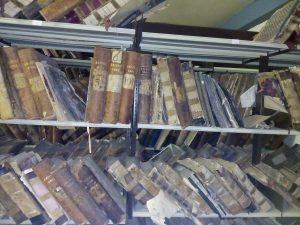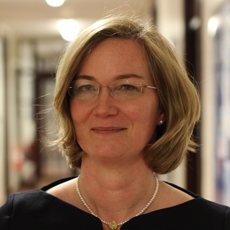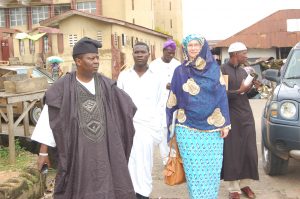
Dr Insa Nolte had her first degree from the Freie Universität Berlin, Germany, after which she joined the Centre of West African Studies (now DASA) at the University of Birmingham as a PhD student to work on the history and politics of Remo under the supervision of Professors Paulo de Moraes Farias and Karin Barber. On completion of her PhD programme, she held the Kirk-Greene Junior Research Fellowship at St Antony’s College, Oxford, and then returned to DASA on completion of her fellowship at the University of Oxford to take up a lectureship in 2001 in DASA and was promoted to the position of a Reader in 2015.
Her research focuses on the importance of private and everyday life for wider social relations and political processes in the Yoruba-speaking Southwest of Nigeria. Her current work centres on the everyday lives of Yoruba Muslims, Christians and traditionalists, and it explores the way in which religious differences and encounters inform social identities, shaped by gender, generation, and education etc. For more information, see project website and blog and/or follow on Facebook and Twitter @KEONigeria.
In Dr Insa Nolte’s academic journal publication “Colonial Politics and Precolonial History: Everyday Knowledge, Genre, and Truth in a Yoruba Town”, she wrote about the processes involved in historical facts gathering in a traditional Yoruba town, as follows:
Historical information was primarily conveyed in narratives called itan which belonged to the representatives of important groups. Thus, the itan of a town was owned by the town’s ruler, who embodied the town. Below that level, itan were held by the heads of important descent and residential groups. But beyond itan, historical information was also conveyed in other genres. Important historical details were transmitted in divination verses, ritual, and a form of praise poetry called oriki, as well as many smaller genres.
Although,
Itan are not told to everybody, and especially details which are considered socially explosive or spiritually dangerous are only passed on to trusted listeners. However, members of any group, whether by descent, residence or initiation, have a strong claim to some knowledge of its itan. By the time an individual attains a degree of seniority in a group, she or he will also have learnt about the group’s itan through participation in group activities, as such knowledge is important in a range of matters including marriage negotiations, land use or chieftaincy debates.
[mixcloud https://www.mixcloud.com/EdusoundsNg/the-importance-of-oral-history-an-interview-with-dr-insa-nolte-episode-5-part2/ width=100% height=120 hide_cover=1 light=1][/mixcloud]
Hence,
Different genres were associated with different social identities, including gender: knowledge of itan tended to be invested in elderly men and oriki were usually performed by women. However, the relationship between genres was symbiotic, and many men knew praise poetry, and especially older women were familiar with historical narratives. While older and respected people tended to have more historical knowledge, the fact that individuals of different backgrounds, genders, and capabilities had access to different aspects of historical knowledge reflected an aesthetics of diversity. Reflecting and creating social boundaries, the segmentation of historical knowledge affirmed individuality and identity. At the same time, it offered the potential for substantiation and corroboration, pointing to the fact that in local debates, truth was an important concern.
Nonetheless, the distributed nature of historical knowledge also meant that the overall fabric of local history was rather loosely woven. While important facts were confirmed by different narratives and genres, the temporal and causal links between such facts could often only be reconstructed through careful interpretation.
But
The introduction of colonial rules altered the views and practices associated with historical production in many African polities. The activities of African intellectuals during the late nineteenth and twentieth century suggest that a re-ordering and re-interpretation of existing categories of knowledge in order to gain a new understanding of the world not only changed the content of historical debate but could also lead to the emergence of new forms of historical argument and representation.
And
In most of Nigeria, the British preference for indirect government privileged historically legitimated rulers, who were appointed to local administrative positions. The influence associated with such posts often offered their holders the possibility to interpret local knowledge in ways that reflected their interests and ambitions. In this way, the administrative logic of the colonial state buttressed Yoruba understandings that town narratives were controlled by their towns’ rulers.
In this conversation, we discuss many issues, amongst which are:
- The importance of oral history
- The creativity involved in translating across lanugages and cultures
- Documenting historical facts in postcolonial Nigeria
- The Martindale report of 1937
Enjoy!
Please, leave your thoughts on this post in the comment section and feel free to share the article/podcast with your contacts. Thanks for taking out of your precious time to read/listen to my article/podcast!
If you like this post, kindly subscribe and/or follow me on Twitter @otukogbe and @EdusoundsNg or on Facebook at edusoundsng.



